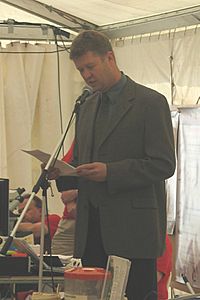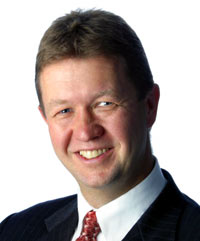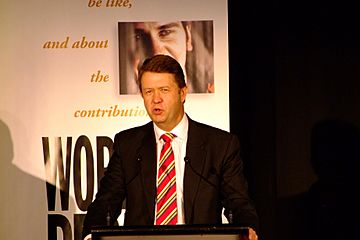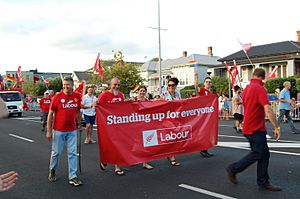David Cunliffe facts for kids
Quick facts for kids
David Cunliffe
QSO
|
|
|---|---|
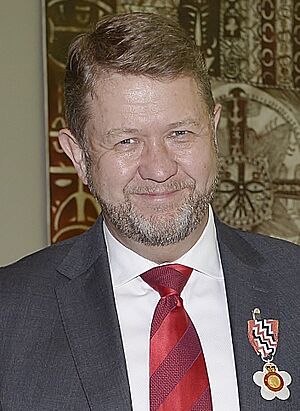
Cunliffe in 2018
|
|
| 34th Leader of the Opposition | |
| In office 15 September 2013 – 27 September 2014 |
|
| Prime Minister | John Key |
| Deputy | David Parker |
| Preceded by | David Shearer |
| Succeeded by | Andrew Little |
| 15th Leader of the Labour Party | |
| In office 15 September 2013 – 27 September 2014 |
|
| Deputy | David Parker |
| Preceded by | David Shearer |
| Succeeded by | Andrew Little |
| 37th Minister of Health | |
| In office 31 October 2007 – 19 November 2008 |
|
| Prime Minister | Helen Clark |
| Preceded by | Pete Hodgson |
| Succeeded by | Tony Ryall |
| 51st Minister of Immigration | |
| In office 19 October 2005 – 11 November 2007 |
|
| Prime Minister | Helen Clark |
| Preceded by | Paul Swain |
| Succeeded by | Clayton Cosgrove |
| Minister of Communications and Information Technology | |
| In office 15 August 2002 – 19 November 2008 |
|
| Prime Minister | Helen Clark |
| Preceded by | Paul Swain |
| Succeeded by | Steven Joyce |
| Member of Parliament for New Lynn Titirangi (1999–2002) |
|
| In office 27 November 1999 – 23 April 2017 |
|
| Preceded by | Electorate re-established |
| Succeeded by | Deborah Russell |
| Personal details | |
| Born |
David Richard Cunliffe
30 April 1963 Te Aroha, New Zealand |
| Political party | Labour |
| Spouse | Karen Price (1984–2015) |
| Relations | Richard Seddon (great-great uncle) |
| Children | 2 |
| Alma mater |
|
David Richard Cunliffe (born 30 April 1963) is a New Zealand management consultant and a former politician. For one year, from September 2013 to September 2014, he was the leader of the New Zealand Labour Party and the Leader of the Opposition.
From 1999 to 2017, he was a Member of Parliament (MP) for the Labour Party, representing the areas of Titirangi and later New Lynn. During the Fifth Labour Government, he held important roles like Minister of Health and Minister of Immigration.
After Labour lost the 2008 election, Cunliffe became the party's finance spokesperson. He tried to become the party leader in 2011 but lost to David Shearer. He ran again in 2013 and won. After Labour's defeat in the 2014 election, he stepped down as leader.
Contents
Early Life and Education
David Cunliffe was born in Te Aroha on 30 April 1963. His family later moved to Te Kūiti and then to Pleasant Point. His father, Bill, was an Anglican minister and a member of the Labour Party.
As a teenager, Cunliffe won a scholarship to study in Wales. He later studied politics at the University of Otago. He worked as a diplomat for New Zealand from 1987 to 1994. He also studied at Massey University and later at Harvard University in the United States. Before entering politics, he worked as a management consultant in Auckland.
Political Career
| New Zealand Parliament | ||||
| Years | Term | Electorate | List | Party |
| 1999–2002 | 46th | Titirangi | 52 | Labour |
| 2002–2005 | 47th | New Lynn | 37 | Labour |
| 2005–2008 | 48th | New Lynn | 31 | Labour |
| 2008–2011 | 49th | New Lynn | 8 | Labour |
| 2011–2014 | 50th | New Lynn | 3 | Labour |
| 2014–2017 | 51st | New Lynn | 1 | Labour
|
Cunliffe was first elected to the Parliament in the 1999 election. He represented the Titirangi area. When the Labour Party formed the government, Cunliffe became the head of an important committee that reviewed laws about business.
For the 2002 election, the boundaries of the voting areas changed, and Cunliffe was elected to represent the new area of New Lynn. He was later given more responsibilities and became a minister.
Cunliffe kept his seat in the 2008, 2011, and 2014 elections, but during this time, the Labour Party was in Opposition. This means they were not the party in power. He eventually became the leader of the Labour Party for one year, from 2013 to 2014.
In 2016, Cunliffe announced he would be retiring from politics. He officially left Parliament in April 2017.
Cabinet Minister (2005–2008)
In 2005, Cunliffe became a member of the Cabinet, which is a group of the most important government ministers. He was first the Minister of Immigration, Communications, and Information Technology. In 2007, he became the Minister of Health, a very senior role.
Communications and Information Technology
As the minister in charge of communications, Cunliffe made big changes to the telecommunications industry. His goal was to increase competition, which led to changes in how the company Telecom New Zealand (now known as Spark) was run.
In 2008, the New Zealand Computer Society gave him a special award for his work in the technology sector.
Health
When Cunliffe became the Minister of Health in 2007, he replaced Pete Hodgson. One of his most well-known actions was in 2008 when he dismissed the entire District Health Board in the Hawke's Bay area because of problems with how it was being run. This decision was controversial, as many of the board members had been elected by the public.
Becoming Leader of the Labour Party
After Labour lost the 2008 election, Cunliffe was seen as a possible future leader. He ran for the leadership in 2011 but did not win.
In August 2013, the party leader, David Shearer, resigned. Cunliffe announced he would run for the leadership again. This time, the party used a new system where party members and unions could also vote, not just the MPs. On 15 September 2013, Cunliffe was elected as the new leader of the Labour Party.
Leader of the Opposition (2013–2014)
As leader, Cunliffe had strong support from regular party members, but not as much from his fellow Labour MPs in Parliament. This sometimes caused tension within the party.
In a 2014 speech about violence against women, he made a comment saying, "I am sorry for being a man." This was meant to be an apology on behalf of men who are violent, but it was criticized by some people, including Prime Minister John Key.
The Labour Party did not do well in the 2014 general election. It received its lowest share of the vote in over 90 years. A few days after the election, Cunliffe resigned as leader of the party.
Political Views
Cunliffe has liberal views on many social issues. He voted for civil unions and to make same-sex marriage legal in New Zealand in 2013.
He has also said that he believes New Zealand will one day become a republic. This would mean replacing the British monarch (the King or Queen) as the head of state with a New Zealander, like a president.
Life After Politics
After leaving Parliament in 2017, Cunliffe returned to work as a management consultant. In the 2018 New Year Honours, he was given a special award, the Companion of the Queen's Service Order, for his service as a Member of Parliament.
Since 2020, he has been a director of a consulting company and the chair of the Selwyn Foundation, a charity that provides services to older people.
Personal Life
David Cunliffe has two sons from his first marriage. His great-great-uncle was Richard Seddon, who was New Zealand's longest-serving prime minister.
Cunliffe is the son of an Anglican minister and has described himself as a "liberal Anglican."
See also
- Shadow Cabinet of David Cunliffe
 | Isaac Myers |
 | D. Hamilton Jackson |
 | A. Philip Randolph |


